Your Guide to NDIS Day Programs in South Australia
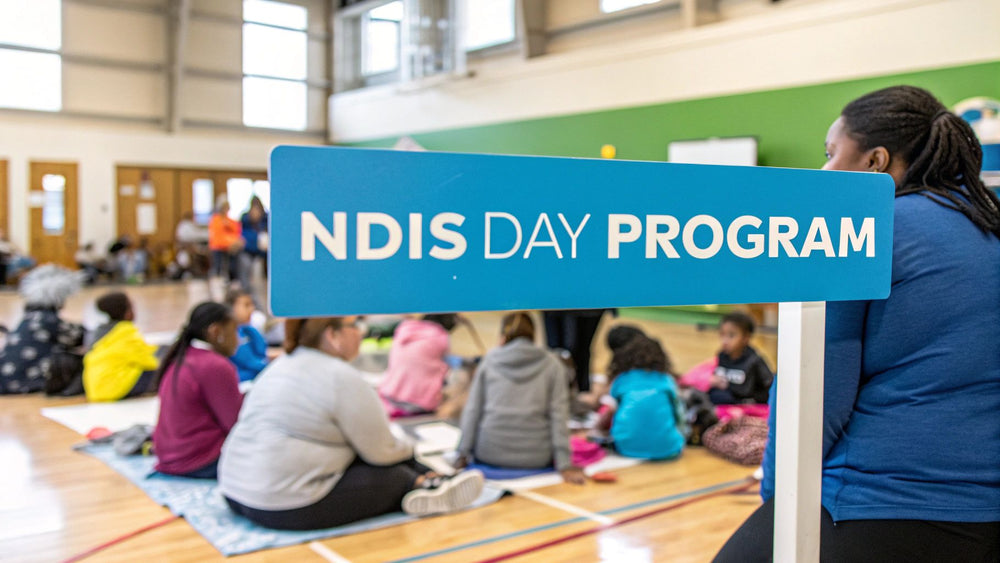
An NDIS day program is a structured, goal-oriented service designed to help you build skills, meet new people, and participate more fully in your community. Think of it less as a place to spend time and more like a personalised workshop for life, funded through your NDIS plan.
Unpacking the Purpose of an NDIS Day Program
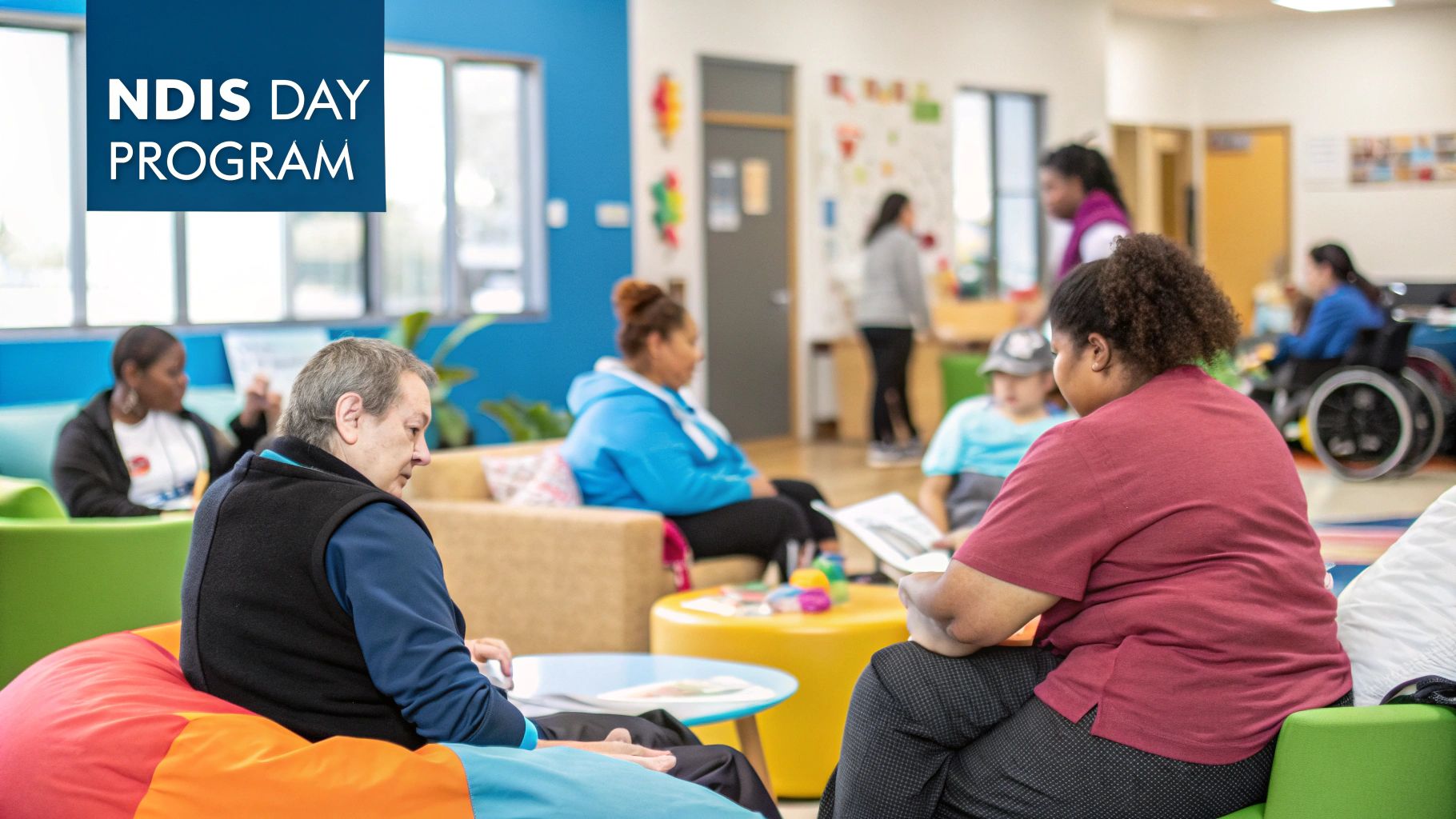
Imagine a community club designed specifically around your personal interests and goals. That’s really the heart of an NDIS day program. It’s a supportive space where you can learn, grow, and connect with others who share similar passions, all while working towards the objectives laid out in your NDIS plan.
These programs go far beyond simple care. They are active, engaging, and fundamentally focused on building your capabilities. The activities on offer are incredibly diverse and are specifically chosen to align with what you want to achieve.
More Than Just a Daily Routine
Unlike old-school day centres that often focused solely on basic care, a modern NDIS day program is all about empowerment. The core idea is to provide structured opportunities that build your confidence and independence in a safe, encouraging environment. The focus is always on you and what you want to get out of the experience.
For example, if one of your goals is to become more social, the program will facilitate group activities like cooking classes, team sports, or local outings. If you’re looking to gain job-ready skills, it might offer training in computer literacy or professional communication.
A quality NDIS day program acts as a bridge between your personal goals and real-world community life. It's not just about what happens inside the program's walls, but how those activities empower you outside of them.
What Kinds of Activities Can You Expect?
The great thing about an NDIS day program is that the activities are shaped by participant goals, which means no two programs are exactly the same. However, you'll find that most activities fall into a few key categories, each designed to support a different aspect of your life.
Some common examples include:
- Creative and Recreational Pursuits: This could be anything from art and music therapy to gardening, drama clubs, and accessible sports. These activities are fantastic for self-expression, managing stress, and, of course, making new friends.
- Life Skills Development: This is a vital part of many programs, where you can learn practical skills for everyday living. Think cooking, budgeting, learning to use public transport, or getting on top of household management.
- Community and Social Engagement: Many programs organise group outings to local attractions, cafes, libraries, or community events. This helps you build connections and feel more a part of your local South Australian community.
- Pre-Vocational Training: For those with an eye on future employment, some programs offer workshops on resume writing, interview practice, and workplace communication to build a solid foundation for entering the workforce.
Ultimately, the aim is to create a balanced and stimulating schedule that helps you move forward. It’s a dynamic space designed to foster growth, connection, and greater independence—all on your own terms.
The Real Benefits of Joining a Day Program
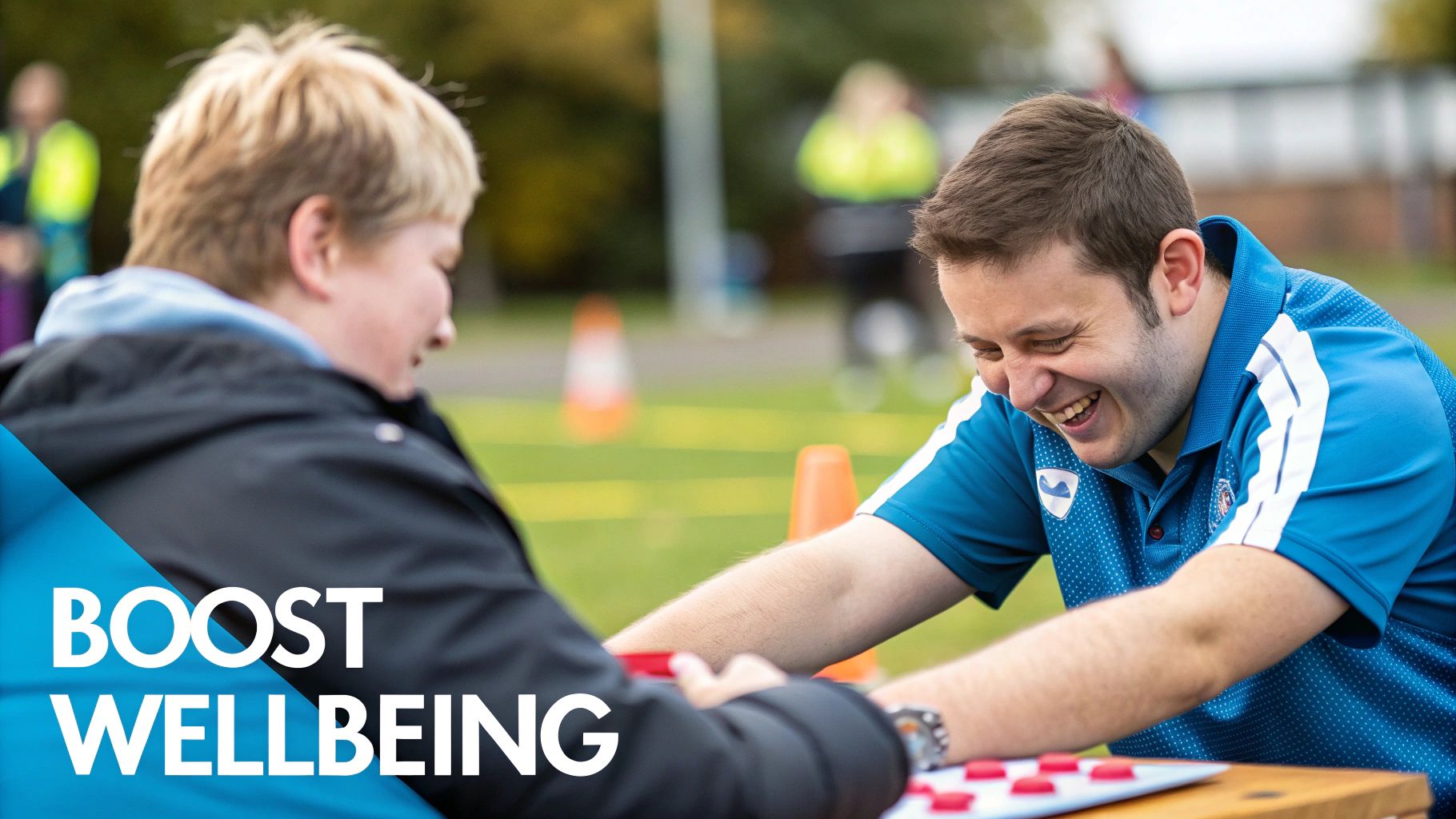
While having a schedule is great, the real magic of an NDIS day program is in the personal growth that happens every day. It’s not just about keeping busy; it’s about building a life filled with meaning, friendship, and new skills. The benefits you'll gain go far deeper than a simple list of activities.
Think of it as a positive ripple effect. Learning a new skill in one area, like cooking, naturally boosts your confidence in other parts of your life, like managing a budget. This interconnected approach is what makes day programs so effective for reaching your goals and improving your overall well-being.
Building Genuine Social Connections
One of the biggest hurdles for many people is feeling socially isolated. A day program offers a relaxed, natural setting to connect with others who get it—people who share your interests and life experiences. It's a space where casual chats can grow into real, lasting friendships.
Shared activities, like a weekly gardening group or a collaborative art project, create the kind of common ground where strong bonds are formed. You’re not just sharing a space; you’re working on something together, sharing laughs, and celebrating small wins as a team. This consistent, positive interaction helps build a social network you can truly rely on.
A day program doesn’t just introduce you to new people; it creates a community you belong to. It’s a space where you are known, valued, and missed when you’re not there—which is vital for our mental and emotional health.
Developing Practical Life Skills
Beyond the social side, day programs are fantastic for learning practical, everyday skills. They take big goals like "I want to be more independent" and break them down into small, manageable steps. This hands-on learning builds real-world confidence that you can take with you everywhere.
For example, instead of just following a recipe, you might learn the whole process of planning a week's meals, shopping for groceries on a budget, and using kitchen equipment safely. One activity teaches multiple life skills. The same goes for learning how to navigate public transport or getting comfortable with technology to stay in touch with family. You can see just how personalised disability care transforms lives in SA when it focuses on these specific, person-centred goals.
Integrating into the Community
A good NDIS day program doesn’t operate in a silo. It should be a springboard that helps you get more involved in your wider community, taking the skills you’ve learned and putting them to use in the real world.
This could mean things like:
- Volunteering for a local cause, like helping out at an animal shelter.
- Joining in local events, like visiting a weekend market or attending a community festival as a group.
- Using local facilities such as the library, public swimming pool, or a community garden.
These experiences foster a genuine sense of belonging and help you become a familiar face in your local South Australian neighbourhood. They build a bridge from structured support to living an independent, engaged life.
The impact of this support system is clear on a national level. As of March 2025, the NDIS was providing support to 717,001 active participants across Australia. This growth shows just how important services like day programs have become in helping people connect with their communities. You can explore the full breakdown of these national statistics and discover more insights about NDIS participant data on their official site.
Who Can Access an NDIS Day Program?
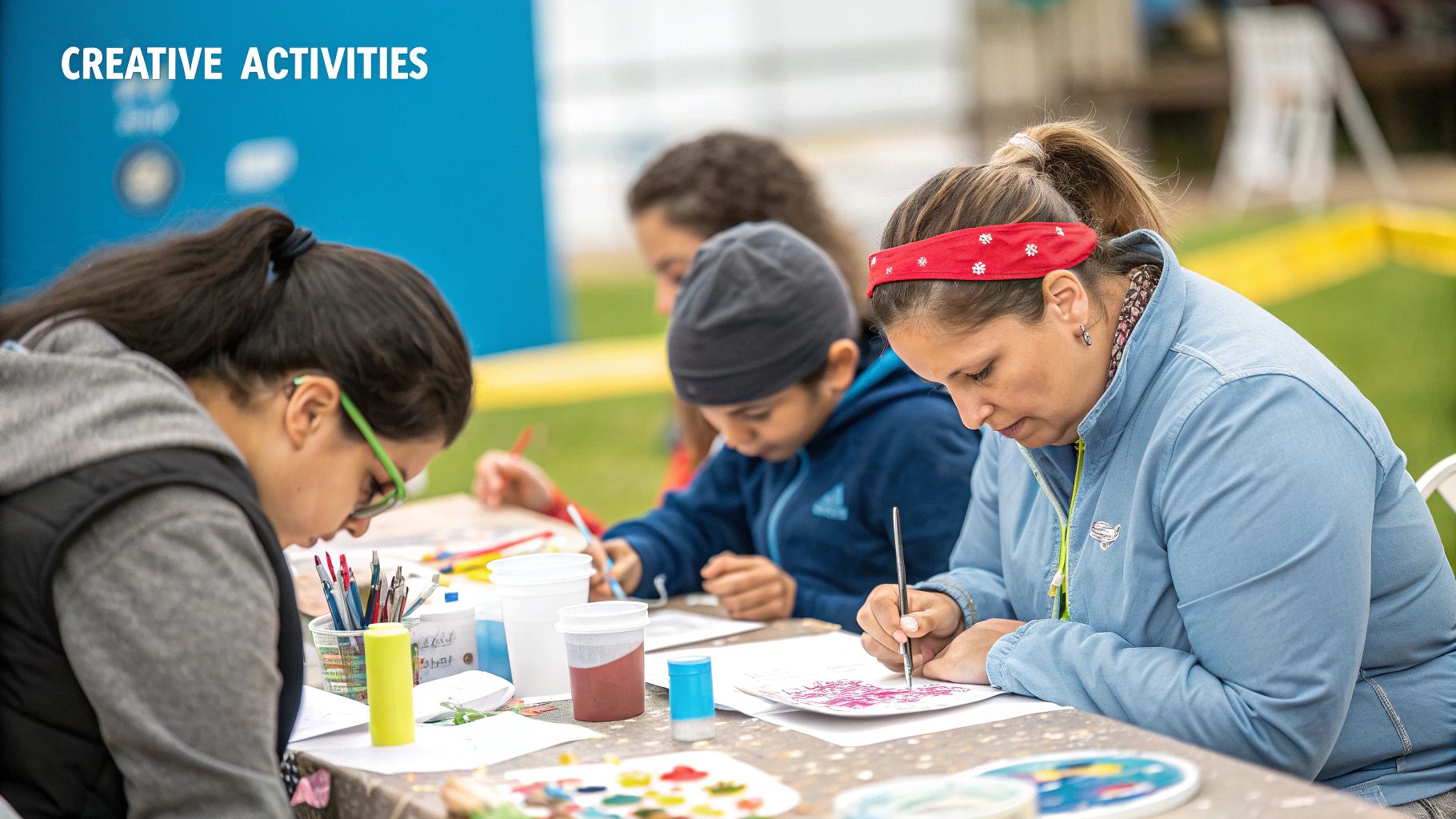
There’s a common myth floating around that you need a specific type of disability to get into an NDIS day program. That’s simply not how it works. The NDIS is far more interested in you as a person—your ambitions, your goals, and what you want to achieve.
Access isn't about ticking a box next to a diagnosis. Instead, the big question the NDIS asks is, "Will this support help you reach your goals?" If you can draw a clear line between attending a day program and your aspirations for social connection, community involvement, or even economic participation, you’re speaking their language. It’s all about showing how the program is a stepping stone for your personal growth.
For example, just saying, "I want to go to a day program," won't get you very far. You need to frame it around the why. A much stronger case would be something like, "My goal is to live more independently, so I want to join a cooking skills program to learn how to prepare my own meals safely."
The "Reasonable and Necessary" Rule
For any support to get the green light in your NDIS plan—day programs included—it must pass the "reasonable and necessary" test. This might sound like official jargon, but the idea behind it is actually quite simple. It just means the support must:
- Be directly related to your disability.
- Offer good value for money.
- Be likely to help you achieve your goals.
Think of it this way: if your goal is to feel less isolated and make new friends, a day program offering group activities and community outings is a very reasonable and necessary support. It’s a practical, effective way to work directly on that goal. For a deeper dive into this, have a look at our guide on navigating the NDIS in Adelaide.
Connecting Your Goals to Program Access
The best way to show that an NDIS day program is reasonable and necessary for you is to clearly link it to your NDIS goals.
Let's break it down with a few real-world examples:
- Goal: Social and Community Participation. You could explain that structured group activities in a day program will help you build confidence, practise social skills, and form a support network of friends.
- Goal: Increased Independence. Perhaps you want to gain more life skills. You can show how a program focused on things like budgeting, cooking, or catching public transport directly contributes to your ability to live more independently.
- Goal: Finding and Keeping a Job. If you have employment goals, a program offering pre-vocational training is a perfect match. It helps you build workplace-ready skills like communication, teamwork, and time management.
The real secret is to shift your thinking from "What can I get?" to "What do I want to achieve, and how will a day program help me get there?" Your personal goals are the key that unlocks access.
This focus on goals is at the very heart of the NDIS. And the good news is, access to services like day programs is incredibly high. Eligibility rates hover around 86% in major cities and 85% in regional towns. The NDIS is on track to support around 715,000 participants by mid-2025, showing just how many Australians are using these supports to chase their goals.
How Your NDIS Funding Covers Day Programs
Figuring out how to pay for an NDIS day program can feel like you're trying to piece together a complex puzzle. But don't worry—once you get the hang of how your NDIS plan is structured, it all starts to make sense. A good way to think about your plan is as a 'funding wallet' with different compartments, each one meant for a specific kind of support.
When it comes to day programs, there isn't a single, dedicated fund. Instead, the costs usually come from two key categories in your plan, depending on what you want to achieve. Knowing which one to draw from is the first step to unlocking these fantastic services.
Core Supports: Your Everyday Funding
Most of the time, the money for an NDIS day program will come from your Core Supports budget. This is the most flexible part of your plan, designed to help you with day-to-day activities and get you out and about in the community.
You'll want to look for a line item called ‘Assistance with Social, Economic and Community Participation’. This funding is specifically for services that help you connect with your community, meet people, and enjoy recreational activities—which is exactly what day programs are all about.
This image shows how your personal support needs, the program's activities, and its location all need to line up for you to find the perfect fit.
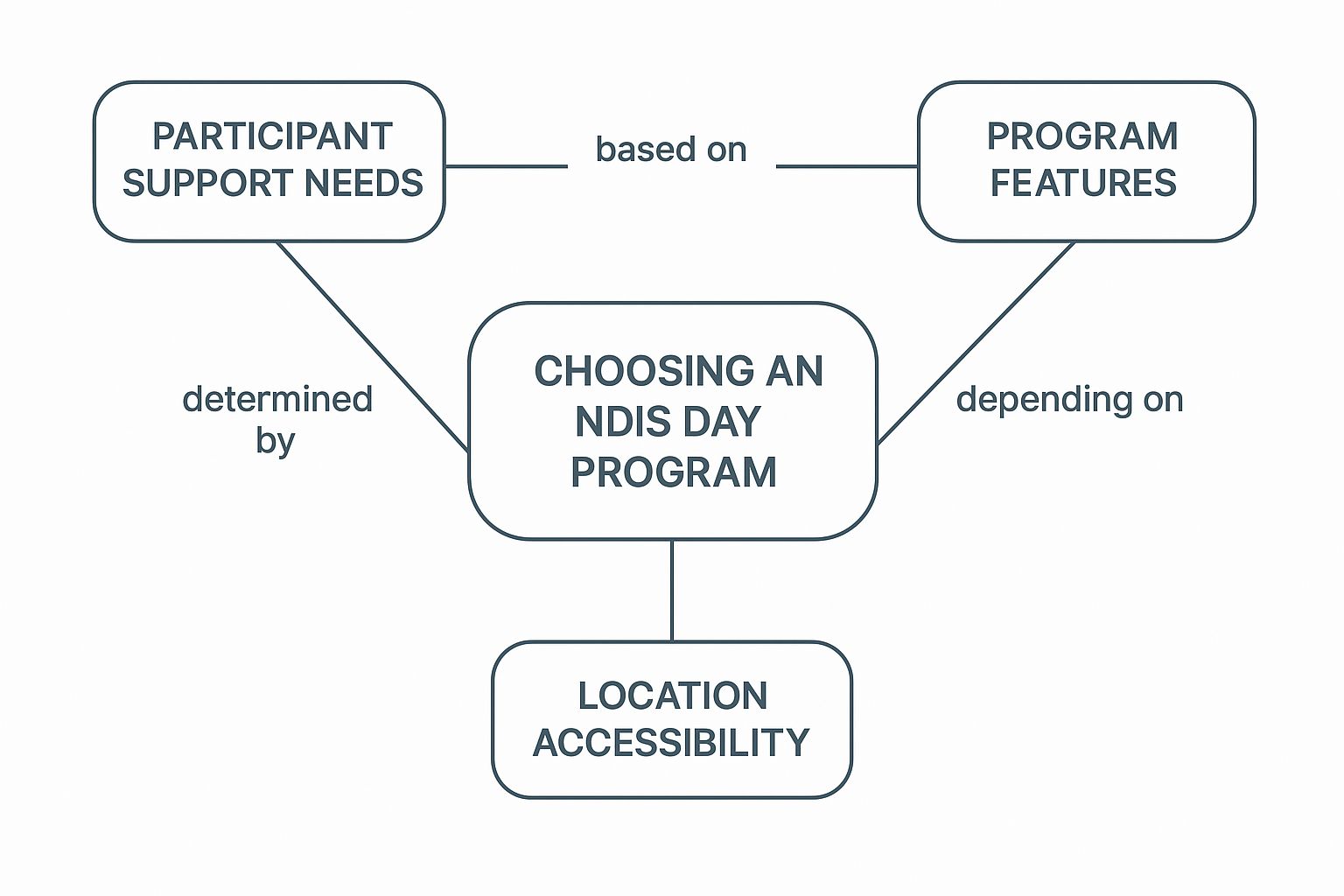
The real takeaway here is that all three elements have to work in harmony. A program might have amazing activities, but it's not much good if it can't provide the support you need or if it’s too hard for you to get to.
Capacity Building Supports: For Growing Your Skills
While Core Supports cover general participation, some day programs are laser-focused on helping you learn and grow. If your main goal is to pick up new skills—like getting ready for a job, improving how you communicate, or learning to manage your own health—then your Capacity Building funds might be the way to go.
There are a few line items under this category that could apply:
- Increased Social and Community Participation: This funding helps you develop the skills and confidence needed to get involved in community life, making it a perfect match for programs that teach social skills.
- Finding and Keeping a Job: If a day program offers specific training to help you prepare for employment, this part of your budget could cover the costs.
- Improved Daily Living Skills: This is ideal for programs that offer practical training in life skills like cooking, managing a budget, or navigating public transport.
The trick is to directly link the program’s activities to your NDIS goals. If a program helps you build a skill that gives you more independence, you can often fund it through your Capacity Building budget.
Preparing For Your NDIS Planning Meeting
Getting funding for a day program really comes down to your preparation for the planning meeting. You need to clearly show the NDIS planner why the program is a ‘reasonable and necessary’ support that will help you reach your goals.
Here are a few tips to help you build a strong case:
- Be Specific About Your Goals: Don't just say you want to go to a day program. Frame it clearly. For instance, "My goal is to feel less isolated, and I believe joining a group program twice a week will help me build new friendships."
- Gather Your Evidence: A letter from your GP, occupational therapist, or psychologist can be incredibly powerful. Ask them to write about how a day program's specific activities will support your wellbeing and skill development.
- Bring Program Details: Come to the meeting with information about the specific day program you're interested in. Be ready to explain what they do and how those activities connect directly to your NDIS goals.
Trying to navigate all this on your own can be tough, but expert guidance makes it so much easier. For anyone needing a hand to translate their goals into a funded plan, understanding the essential role of support coordination can be a real game-changer. A great Support Coordinator will help you prepare for your meeting and make sure your case for a day program is communicated clearly and effectively.
Choosing the Right Day Program in South Australia
Finding the right NDIS day program in South Australia isn’t about just ticking boxes off a list. It's much more personal than that. Think of it like finding a new community or a hobby group—it has to feel right for you. The goal is to find a place where you or your loved one can genuinely thrive, not just show up.
This means you’ll need to look past the glossy brochures and get a real sense of the program's atmosphere. What’s the vibe? Are the staff experienced and genuinely caring? A great provider will be open, welcoming, and excited to show you exactly how they can help you build independence and connect with your community.
Create Your Personalised Checklist
Before you even start Googling providers, the best first step is to figure out what you're actually looking for. Creating a personal checklist shifts the focus from what a program offers to what you truly need and want. This simple act makes your search so much more effective.
Think about these key areas:
- Your Personal Goals: What are you hoping to get out of this? It could be making new friends, learning practical skills like cooking, getting ready for a job, or finally diving into a hobby like art or music. Get specific!
- Your Interests and Passions: What do you genuinely enjoy doing? A program built around something you love—whether that's gardening, gaming, or sports—will feel like an adventure, not a chore.
- Support Needs: What level of support do you need to feel comfortable and confident? Consider the ideal participant-to-staff ratio that works best for you.
- Program Culture: Are you looking for a quiet, calm space or a high-energy, bustling environment? The right atmosphere is crucial for feeling engaged and happy.
This official NDIS page for South Australia is a fantastic starting point. It has all the key local contacts and information, connecting you with the right resources right here in the state. Getting familiar with the local landscape is vital, as it ensures you’re finding providers who understand SA communities.
With a growing number of NDIS providers in South Australia, you have more choice than ever. The trick is to find one that's deeply connected to the local community and can offer support that feels close to home. This is especially important as NDIS participation continues to expand across our state.
Taking Action to Find the Right Fit
Once your checklist is ready, it's time to start the search. Online research is a good place to begin, but nothing beats seeing a place with your own eyes. You need to get a real feel for a program before making any decisions.
Here are the essential steps to take:
- Schedule a Visit: Always book a tour. When you're there, pay close attention to the atmosphere. Do the people participating look happy and engaged? Are the staff friendly and interacting naturally?
- Ask Targeted Questions: Don't hold back! This is your chance to interview them, and a quality provider will welcome your questions with open arms.
- Request a Trial Day: Honestly, the best way to know if a program is a good fit is to actually try it. Most providers are happy to arrange a trial day or a shorter session so you can experience it firsthand.
When you visit, try to go beyond the usual questions. Ask something like, "Can you tell me a story about how you helped someone achieve a goal similar to mine?" Their answer will reveal a lot about their values and how they really operate.
Key Questions to Ask a Potential Provider
When you visit or call a potential NDIS day program, having a few questions ready will help you get the information you need to make a confident choice.
- What qualifications and experience do your support workers have?
- What is the typical participant-to-staff ratio?
- How do you make sure the activities are personalised to my goals and interests?
- How do you help people get out and about with real community access and support services beyond the centre?
- Can you give me an example of how you track progress towards someone's goals?
- What are our options for transport to and from the program?
Finding the right provider is a big deal, particularly in a state with a rapidly growing number of NDIS participants. As of March 2025, South Australia had 60,859 active participants with approved plans—a noticeable increase from the end of 2024. This growth just highlights the increasing need for high-quality, local NDIS services. For a closer look at the data, you can learn more about South Australia’s NDIS participant statistics.
Getting the Most from Your Day Program
You’ve done the hard yards—you’ve researched, asked the right questions, and finally chosen an NDIS day program that feels like a great fit. So, what now? The secret to turning a good experience into a truly fantastic one comes down to one thing: your proactive involvement from day one.
Think of your first day not just as a starting point, but as the beginning of a genuine partnership. It’s the perfect time to sit down with the program staff and get really clear about what you want to achieve. Instead of just saying you want to "be more social," dig deeper. Maybe that means you want to build the confidence to start a conversation, or perhaps you dream of joining a local club. The more specific you can be, the better they can shape the activities to help you get there.
Be an Active Participant
To really squeeze every drop of value out of your program, you’ve got to jump in with both feet. Lean into the activities that genuinely excite you, but don’t shy away from trying something completely new, either. You might just discover a hidden passion.
And if there’s something you’re passionate about that the program doesn’t offer yet? Speak up! A quality provider will always be open to new ideas and will appreciate your input. Your feedback is gold. Regularly checking in with staff to let them know what’s working and what isn’t helps the program grow with you. This constant dialogue ensures it stays relevant to your goals as they evolve. An active lifestyle is a huge part of this, and you can learn more about boosting well-being for disabled individuals in South Australia to understand how programs contribute to your overall health.
Building Your Support Network
While the staff are an essential part of your journey, don’t forget to connect with your peers. The other participants are on their own paths and can become an amazing source of friendship, encouragement, and real-world advice. These are the relationships that often blossom outside the program’s walls, building a strong, lasting community.
Your NDIS day program is more than just a service—it's a launchpad for personal growth. Your voice is important, your progress deserves to be celebrated, and your goals should always be front and centre. Advocate for yourself, and never be afraid to ask for a change of direction if your needs or interests shift.
For anyone with a learning disability like dyslexia, looking into the best assistive technology for dyslexia) can make a world of difference to their learning and engagement in a day program. By actively participating, giving honest feedback, and building connections, you’re not just attending a program; you’re steering your own journey toward greater independence and a richer community life.
Frequently Asked Questions
Getting your head around the ins and outs of an NDIS day program can bring up a few questions. We get it. Here are some straightforward answers to the things we're most often asked by participants and their families here in South Australia.
What Is the Difference Between a Day Program and Respite Care?
This is a great question, as the two can sound similar but have very different aims.
Think of an NDIS day program as being all about you and your growth. Its main purpose is to help you learn new skills, chase your personal goals, and get more involved in your community. It’s an active, goal-focused support.
Respite care, which the NDIS calls Short Term Accommodation (STA), is mainly there to give your usual carers a well-earned break. While you'll still do enjoyable things, the core reason for respite is to support the wellbeing of your family or support network. Because their purposes are so distinct, they are funded as separate items in your NDIS plan.
Can I Use NDIS Funding for Transport to My Day Program?
Yes, this is often possible. If getting to and from a day program is something you can't do without support, then transport can be funded by the NDIS because it’s considered 'reasonable and necessary'. After all, without a ride, you can’t get to the program to work on your goals.
It's really important to discuss your transport needs in your NDIS planning meeting. You'll need to clearly explain why you need funded transport to be able to participate. This is usually included as a specific line item in your Core Supports budget, so be sure to raise it directly.
Your ability to access a program is just as important as the program itself. Don't be afraid to advocate for the transport you need to make your participation possible and consistent.
Do I Have to Attend a Day Program Every Day?
Not at all. Flexibility is one of the key benefits of a good NDIS day program. These services are meant to fit into your life, not make you fit your life around them. You're in the driver's seat when it comes to your schedule.
Most providers will have plenty of options, whether you want to come in for just one day, a couple of days, or more each week. You can work directly with the provider to build a timetable that suits your energy levels, your other commitments, and the amount of funding in your NDIS plan.
What if I Start a Day Program and Do Not Like It?
Your NDIS plan is founded on choice and control, meaning you are never stuck with a service that doesn't feel right. If a program isn't a good match for you, you absolutely have the power to change it.
The best first step is to have a chat with the program manager about what's not working. Sometimes a few simple tweaks can solve the problem. But if it's just not the right fit, you have every right to look for another provider. Your NDIS funding belongs to you, not the service, giving you the freedom to find a program that truly helps you thrive.
At Vana Care, we know that finding the right support is about more than just services—it's about finding the right people. We're committed to providing disability services across Adelaide and South Australia that put your goals, interests, and wellbeing first. If you’re looking for a provider that feels like people helping people, explore our NDIS support services and see how we can help you live with more independence and joy.


